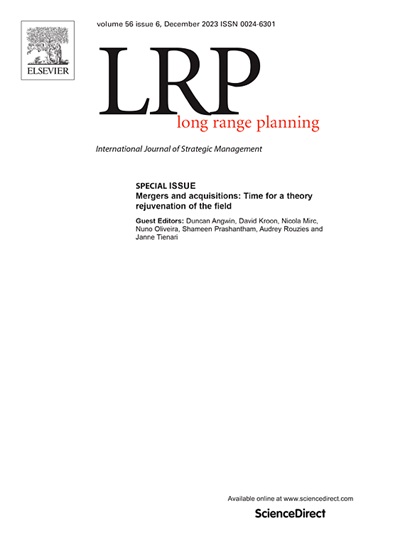A review of cognitive biases in strategic decision making
IF 6.3
2区 管理学
Q1 BUSINESS
引用次数: 0
Abstract
This paper presents an integrative review of empirical research (2000–2023) on cognitive biases that affect decision makers in established organizations as they make strategic decisions. We examine patterns in the measures, antecedents, and outcomes of two broad categories of biases: systematic biases that operate similarly across individuals (e.g., overconfidence, escalation of commitment, loss aversion, and myopic loss aversion), and idiosyncratic biases that depend on the decision maker's experience and past interactions (e.g., myopia and local search bias). We also distinguish between findings with strong empirical evidence and those with less empirical support. Our review indicates researchers measure both types of bias using one or more of three broad approaches: assuming or inferring the bias, measuring it directly, and experimentally manipulating the bias and observing its effects. We find strong empirical support for firm ownership, performance or performance relative to aspirations, and CEO compensation and wealth as antecedents to loss aversion and myopic loss aversion. We also find that loss aversion has strong but mixed effects on outcomes such as diversification or internationalization, acquisitions, R&D intensity or investments, and risk taking. Findings with less empirical support include, among others, mostly mixed effects of loss aversion and framing on innovation, mostly positive effects of overconfidence on innovation and risk taking, and negative effects of overconfidence on corporate social responsibility, performance, and forecasting. Based on our findings, we discuss the challenge of identifying and measuring a bias in a way that is relevant to strategic management and suggest directions for future research.
战略决策中的认知偏差研究综述
本文对2000-2023年的实证研究进行了综合综述,探讨了认知偏见在成熟组织中对决策者做出战略决策的影响。我们研究了两大类偏见的测量、前因和结果模式:系统性偏见,在个体中运作相似(例如,过度自信、承诺升级、损失厌恶和近视损失厌恶),以及依赖于决策者经验和过去互动的特质偏见(例如,近视和本地搜索偏见)。我们还区分了具有强有力的经验证据的发现和缺乏经验支持的发现。我们的综述表明,研究人员使用以下三种方法中的一种或多种来测量这两种类型的偏差:假设或推断偏差,直接测量偏差,通过实验操纵偏差并观察其影响。我们发现,公司所有权、绩效或绩效与抱负、CEO薪酬和财富是损失厌恶和近视损失厌恶的先决条件,这些都有强有力的实证支持。我们还发现,损失厌恶对多元化或国际化、收购、研发强度或投资以及风险承担等结果具有强烈但混合的影响。实证支持较少的研究结果包括,损失厌恶和框架对创新的混合影响,过度自信对创新和风险承担的积极影响,以及过度自信对企业社会责任、绩效和预测的消极影响。基于我们的研究结果,我们讨论了以与战略管理相关的方式识别和衡量偏见的挑战,并为未来的研究提出了方向。
本文章由计算机程序翻译,如有差异,请以英文原文为准。
求助全文
约1分钟内获得全文
求助全文
来源期刊

Long Range Planning
Multiple-
CiteScore
13.00
自引率
7.10%
发文量
75
期刊介绍:
Long Range Planning (LRP) is an internationally renowned journal specializing in the field of strategic management. Since its establishment in 1968, the journal has consistently published original research, garnering a strong reputation among academics. LRP actively encourages the submission of articles that involve empirical research and theoretical perspectives, including studies that provide critical assessments and analysis of the current state of knowledge in crucial strategic areas. The primary user base of LRP primarily comprises individuals from academic backgrounds, with the journal playing a dual role within this community. Firstly, it serves as a platform for the dissemination of research findings among academic researchers. Secondly, it serves as a channel for the transmission of ideas that can be effectively utilized in educational settings. The articles published in LRP cater to a diverse audience, including practicing managers and students in professional programs. While some articles may focus on practical applications, others may primarily target academic researchers. LRP adopts an inclusive approach to empirical research, accepting studies that draw on various methodologies such as primary survey data, archival data, case studies, and recognized approaches to data collection.
 求助内容:
求助内容: 应助结果提醒方式:
应助结果提醒方式:


